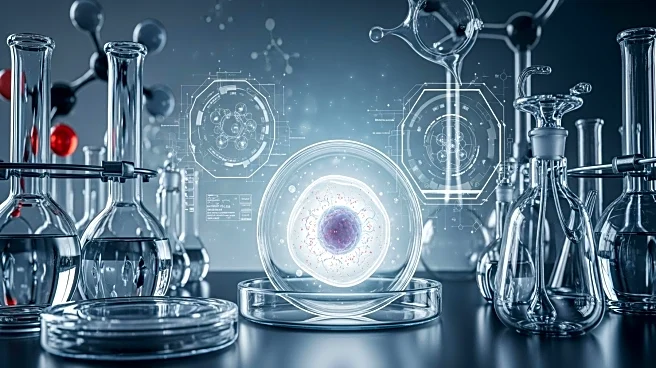What's Happening?
A group of bioengineers, including Kate Adamala and Drew Endy, are pioneering efforts to construct a synthetic cell from scratch. This initiative aims to deepen the understanding of cellular functions, which remain complex despite being fundamental to life. The project involves piecing together the components of a cell to simulate its environment and operations. The endeavor is driven by the need to comprehend the intricate workings of living cells, which are more numerous in the human body than stars in the Milky Way galaxy. The research is part of a broader effort to advance bioengineering and potentially revolutionize biological sciences.
Why It's Important?
The creation of synthetic cells could have significant implications for various fields, including medicine, biotechnology, and environmental science. By understanding cellular mechanisms at a granular level, scientists can develop new treatments for diseases, enhance drug delivery systems, and create sustainable biofuels. This research could also lead to breakthroughs in genetic engineering and synthetic biology, offering solutions to global challenges such as food security and climate change. The project underscores the importance of interdisciplinary collaboration in advancing scientific knowledge and technological innovation.
What's Next?
As the research progresses, bioengineers will continue to refine the synthetic cell model, aiming to replicate more complex cellular functions. This could involve integrating artificial intelligence to optimize the design and functionality of synthetic cells. The scientific community is likely to monitor these developments closely, with potential collaborations across universities and research institutions. The outcomes of this research may influence future policies on bioengineering and synthetic biology, as well as ethical considerations surrounding the creation of artificial life.
Beyond the Headlines
The ethical implications of creating synthetic life forms are profound, raising questions about the definition of life and the potential consequences of manipulating biological systems. This research could challenge existing legal frameworks and cultural perceptions of life, prompting discussions on the moral responsibilities of scientists and policymakers. Long-term, the ability to engineer life from scratch could redefine humanity's relationship with nature and technology, leading to new philosophical debates about existence and creation.










